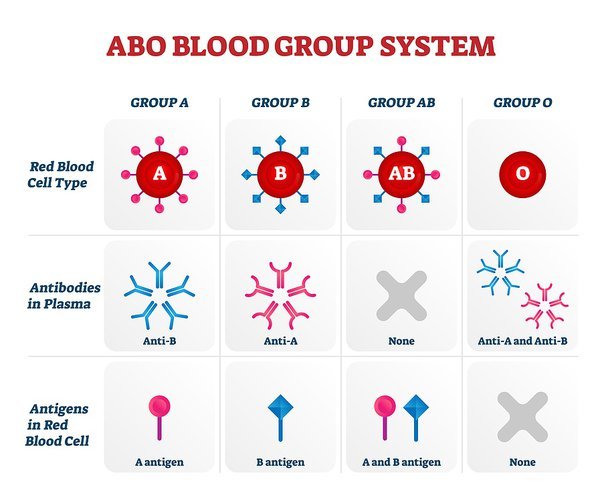Is type O blood linked to lower COVID-19 risk? Is taking vitamin D unlikely to help?

In short form:
I am explaining below that separate genetic studies showed that severe Covid-19 disease develops with blood group A patients (45% higher risk). In contrast group O blood group patients have milder Covid-19 disease (35% less risk).
So, yes type O blood is linked to lower COVID-19 risk. The clinical Covid-19 course will still be milder for all blood groups when blood vitamin D levels are in the 50–80 ng/mL range (that is 125-200 nmol/L).
Here is the more detailed version:
Blood Type Has Some Bearing on the Severity of Covid-19 Coronavirus
Two independent research publications concluded that blood type has some bearing on the severity of Covid-19 coronavirus infections. One was published in Denmark, the other one in Canada.
In the US the 4 common blood types occur with this frequency: group O: 45% (O positive 38%, O negative 7%); group A: 40% (A positive 34%, A negative 6%); group B: 11% (B positive 9%, B negative 2%) and group: AB 4% (AB positive 3%, AB negative 1%). Positive and negative stands for the Rh group (the rhesus factor, which is another type of blood group).
Two separate publications
Denmark study
Briefly, the Denmark study showed that when positive and negative tests for the SARS-CoV-2 virus were checked in relationship to blood groups, blood group O had 13% less coronavirus infections, group A had 9% more infections, group B had 6% more infections and group AB had 15% more infections than negative controls.
This means that blood group O is relatively protected from the SARS-CoV-2 virus. The investigators were fast to add that this does not give people with a group O blood type a licence to go to the pub and celebrate.
Canadian study
The Canadian study looked at 125 critically ill people with positive SARS-CoV-2 virus tests. Of these 95 had ABO blood types available.
All these patients were admitted to the ICU. Here are the significant findings: 32% of blood group A required intubation versus 84% of AB patients, 35% of O group patients and 61% of B patients required intubation.
12% of A patients and 32% of AB patients, but only 5% of blood group O patients and 9% of B patients required kidney support (continuous renal replacement therapy).
In addition, group O and group B patients required a median ICU stay of only 9 days. In contrast, group A and AB had to stay in the ICU for 13.5 days.
Gene study to determine susceptibility for severe Covid-19 disease
In a European genetic study from Italy and Spain 835 patients and 1255 control participants had genetic studies done. It turned out that the genetic loci that determined the severity of Covid-19 followed the blood groups.
Blood group A patients had a 45% higher risk of developing severe Covid-19 disease, while group O patients had a 35% lesser risk compared to other blood groups of developing severe Covid-19.
Discussion
Dr. Mypinder Sekhon, an intensive care physician at Vancouver General Hospital stated that people with a blood group O make less of a key clotting factor, which makes them less prone to clotting problems in the blood.
The association of ABO blood group with indices of disease severity and multiorgan dysfunction in COVID-19 Clotting is a major driver in complications of Covid-19. Other possible explanations are the blood group antigens and how they interact with antibodies from the infection with Covid-19 coronavirus.
Finally, it could be related to the genes of the blood groups and how they interact with receptors of the immune system. It is interesting to also note that there are genetically different risks that go along the line of the blood groups with group A having much higher risk than group O to develop severe Covid-19 disease.
Conclusion
Both research in Denmark and in Canada confirmed that blood group O had less coronavirus infections. In the Denmark study there were 13% less severe Covid-19 cases in people with the blood group O than in negative controls.
In the Canadian study of 95 patients with severe Covid-19 physicians had to admit them into the ICU. They noted that 84% of blood group AB patients in the ICU required intubation. In contrast, only 35% of O group patients required intubation.
With regard to kidney support, 32% of AB patients, but only 5% of O patients required this during their ICU stay.
More research required to understand these findings
The researchers added that it is not clear why there are such differences among patients with different blood groups. They mentioned that more research is necessary.
This will reveal why group O has a milder course. It will also show why group O patients require less intubation and shorter ICU stays. Separate genetic studies showed that severe Covid-19 disease develops with blood group A patients (45% higher risk).
In contrast group O blood group patients have milder Covid-19 disease (35% less risk). It is with these investigations that we can now understand some of the peculiarities regarding the Covid-19 disease. It explains why some people develop severe Covid-19 disease while others develop only mild symptoms.